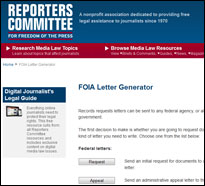Lucy Dalglish is the Dean of Phillip Merrill College of Journalism at the University of Maryland. She is a leading expert in media law, having served as executive director of the Reporters Committee for Freedom of the Press from 2000 to 2012. She has also been an editor and reporter.
Issues of press freedom, surveillance, shield laws and protecting confidential sources continue to be in the news, and many rules and norms are evolving. As part of our research chat series, Journalist’s Resource recently caught up with her to talk about media law and education.
The following is an edited transcript:
________
Journalist’s Resource: What’s different about practicing journalism and covering national security issues today, as compared with a decade ago?
Lucy Dalglish: You have to look at the evolution of national security coverage and government reaction to those stories through the lens of technology. The technology that journalists use has changed dramatically in the last 10 years. Our ability to use the Web and other online resources to gather and disseminate information has completely changed. It has expanded. There is less time available to report those stories. The public expects our coverage to be nearly instantaneous.
All of this has happened at the same time that all businesses and government agencies have been spending time worrying about cyber-security. All universities have been working to prepare students to work in a cyber world. And the government has been working as hard as it can to learn as much as it can about almost everybody, and do it at a time when the law has not developed fast enough to handle these issues. Congress and the courts have not told government agencies what they can and cannot collect, and what they can and cannot use. At the same time there certainly has not been enough time to prepare enough Americans to protect us from a whole host of cyber threats. One of my friends, who is the dean of the engineering school, says, “World War III will be fought in cyber space.”
All of that is going on while we in journalism are doing what we’ve always done, which is to gather information from people who have knowledge and disseminate it to the public.
In the old days, journalists could have conversations with sources, probably over the telephone. And then a source who has been developed might hand you a manila envelope with some documents that they had surreptitiously photocopied. Then reporters were able to analyze the documents and discuss them with their editors and lawyers. Then the reporters would, for example, go to the White House and say, “I’m a reputable journalist, and I do not want to damage national security. Is there anything in here in this information that I am ready to report for which you can give me an argument — that I buy — why I should not publish it?”
Well, guess what? Those days are pretty much gone. The exchange between source and journalist happens differently. Who we consider to be a journalist has changed — it’s expanded. The government’s ability to track people has expanded. And, I think, the potential for damaging information — that truly could damage national security — has increased. Some of these sources are people who potentially don’t care about the consequences on the ground, or are in such a competitive scenario that they can’t take the time to think about it. It’s also extra-territorial. You have people around the world getting these documents. And you have more secrets being kept and more people who have access to those secrets.
JR: What do you make of what has been done lately by the federal government? Many complain they have been too aggressive.
Lucy Dalglish: People ask why the Obama administration is the most aggressive in terms of going after whistle-blowers. Isn’t it obvious? They have a situation that they have to manage in which top secret data can literally be dumped on the Internet in the blink of an eye. They probably can’t figure out what else to do.
You put all of that together into this cyber ecosystem, and we’re not even playing the same game we were playing 10 years go. The law clearly has not kept up with these new realities. But one thing that has not changed is the ethical obligation journalists feel to protect the people who come forward and give them valuable information.
JR: These national security-related issues have been weighing heavily on the journalism community. But just to clarify: Is there any sense that the worries about confidential sources and surveillance of journalists may extend down to the state and more local levels? Should non-national security journalists be worried about a more general erosion of First Amendment protections?
Lucy Dalglish: The risks are usually different. On the local level, when somebody wants to know the identity of a source, for example, in a school board story, there are different dynamics. There are probably not people on a school district’s payroll who cyber-track people.
JR: Could they?
Lucy Dalglish: Maybe. But it’s an expenditure that most local governments have not yet invested in. The folks who need to worry about this the most are people who cover the federal intelligence agencies. I could see this tracking also involving interactions with local federal contractors; there are many facilities around the country, as the Washington Post and reporter Dana Priest showed in their series “Top Secret America.” Federal law can apply in those places with federal installations. For the most part, you need to be worried about this when you are reporting on something that touches homeland security.
Most of the local subpoenas of journalists that we see are still for eyewitnesses in relation to, for example, someone clubbing someone over the head at a local protest. We also see them around business disputes, or libel cases, where they want to know who the source was. Local subpoenas typically involve your run-of-the-mill civil and criminal cases.
JR: So there may be a chilling effect across the national security space, but other reporters need not necessarily worry.
 Lucy Dalglish: I have heard from reporters and sources — and granted I’ve been mostly talking to them in the Washington, D.C., area — that the chilling effect is across the federal government. I have been told that the chilling effect has gone beyond the federal agencies that deal with national security. I was recently told that someone couldn’t get a park ranger to answer a question. But will the government typically try to electronically track email when in all likelihood your source was a park ranger at the Great Smoky Mountains? Probably not.
Lucy Dalglish: I have heard from reporters and sources — and granted I’ve been mostly talking to them in the Washington, D.C., area — that the chilling effect is across the federal government. I have been told that the chilling effect has gone beyond the federal agencies that deal with national security. I was recently told that someone couldn’t get a park ranger to answer a question. But will the government typically try to electronically track email when in all likelihood your source was a park ranger at the Great Smoky Mountains? Probably not.
JR: Let’s talk about documents and Freedom of Information Act (FOIA) issues. Where do we stand on these issues writ large?
Lucy Dalglish: The federal Freedom of Information Act is still a mess. They have amended it in recent years to improve tracking of requests; they have empowered more federal FOIA officers to interact with requesters to get a better idea of what they want. They have made it easier for you to request documents from the federal agencies. Most will let you do it by email. They have made some logistical improvements.
But if somebody was going to say “no” to you 10 years ago, they are going to say “no” to you today. We haven’t seen a lot of substantive changes. We have seen some legal decisions, such as Milner vs. Department of the Navy, that had to do with overuse of exemptions by the government to avoid disclosure. The states are, in general, in better shape, and you often don’t need to make a request in writing to a state or local government. I would like to see more states have “fee-shifting,” so that if you have to sue before you get documents, you can get your expenses recovered. I wish more states would do that. Then, there are always cases where, even if the existing state FOIA laws are good, every time the state legislature is in session you have to stay vigilant, because someone is always going to say, “I know it’s important to have FOIA laws, but I don’t want to give up document X.” That’s always going on.
My biggest fear right now is that, traditionally, the biggest defenders of the state laws have been state newspaper associations. They have spent a lot of time and money getting those laws passed and getting them enforced. The market forces that have hit the newspaper world have limited the number of times those publishers can afford to show up in places like Bismarck, N.D., or other state capitals, and fight for an open-records law. They are still doing that, God bless them, but it’s a lot tougher for them to pull it off these days. In states where they have fee-shifting for FOIA, where costs can be recouped, that’s great.
In cases having to do with court records, your costs are almost never reimbursed. That’s just pure out-of-pocket costs. I spent a lot of time at the Reporter’s Committee worrying about that. There are some very good state open-government nonprofit coalitions that have been created. They run on a shoestring budget. Most are 501(c)(3)s that have limited ability to engage in lobbying. But they are very good at educating the public what their rights are. It’s simply difficult to run a nonprofit in these economic times.
JR: Where do we stand on “credentialing” issues now — the dynamics of how government or other powerful organizations decide who is a journalist in the digital age?
Lucy Dalglish: I think anyone is a journalist who is able to walk into a government agency and say, “I routinely cover this body. I produce information that is disseminated to an audience that cares what you are up to — and I have a following. People pay attention to what I write or shoot.” If you can say that, I think you should qualify. Now, do I think anybody off the street should be able to have the same access? That would probably completely overwhelm our tax-payer supported agencies. However, if you can show that you are essentially doing journalism, you should be able to apply for credentials. Sometimes credentials are limited. You should have a fair shake at it. But you should be able to demonstrate a body of work.
JR: How should journalism schools educate their students to deal with this emerging legal-media world?
 Lucy Dalglish: First of all, it’s a bad idea to have media law classes as electives in journalism school. They should be mandatory. But also, your other journalism classes need to bring in these issues as they arise, whether it’s in a writing or photography course. Bring it in as a natural part of your courses. Don’t just leave it to the law and ethics professors. It needs to be a natural part of what you do every day. I think at Merrill we do a really good job of that. It’s also important that in your investigative-reporting courses and computer-assisted reporting courses the use of public records is routine — and that you actually make the students request the records. Make them go out and get a public database. I think most schools are doing that.
Lucy Dalglish: First of all, it’s a bad idea to have media law classes as electives in journalism school. They should be mandatory. But also, your other journalism classes need to bring in these issues as they arise, whether it’s in a writing or photography course. Bring it in as a natural part of your courses. Don’t just leave it to the law and ethics professors. It needs to be a natural part of what you do every day. I think at Merrill we do a really good job of that. It’s also important that in your investigative-reporting courses and computer-assisted reporting courses the use of public records is routine — and that you actually make the students request the records. Make them go out and get a public database. I think most schools are doing that.
I think you’ve heard that journalism is the epitome of learning by doing. And we’re going to be doing more of that. Our colleges are going to become news organizations. It used to be that if you were taking advanced reporting, the only person who would see the story was the teacher. Now our students are publishing the day they walk through our doors. We are legally responsible for that. If it’s in a course, or on a school website, we are responsible — if not legally, then ethically. We have to bring these values and knowledge in immediately.
I had a student last year, a good, energetic reporter, who went to a press conference with Vice President Joe Biden and Attorney General Eric Holder. He was standing in a place where Biden’s handlers didn’t want him to be, and he took some photos. So the vice president’s staff ordered him to erase his photos. That was quite a lesson for others in the class. I fired off a letter, 20 minutes after hearing about it, saying that deleting photos was illegal. I got a call from the Vice President’s office apologizing for forcing the student to erase his photos. I said, “Don’t apologize to me. Here’s his name. Call him.” But that was also a learning experience for our students. We said, “You’ve learned about this in the abstract. Now you need to dissect what happened step by step, and figure out what to do the next time this happens.”
Mostly, the challenge is how you take these rights and pass the knowledge on to the students so they can practice them on a daily basis, and have them talk about what it means to protect confidential sources. They might have an idea about the law in the state of Maryland. But the minute they walk out the door and cross state lines, the rules are different. They need to be prepared for that.
Keywords: training, law, news


Expert Commentary